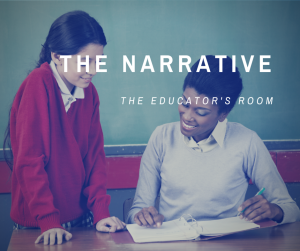 In my brain lives a little monster.
In my brain lives a little monster.
I know I’m not alone. We all have little monsters lurking in our skulls. They hate anything rest related and love to do things like leap up and down and shout, “DID YOU SET THE ALARM FOR 5???” …right as sleep is about to overtake you.
At the end of each school year, as much as I want to simply switch my brain to vacation mode, this is when my monster is most active. She looks back on the year and insists on nagging me about every unresolved issue and unsatisfying conversation. Luckily, I can usually quiet the monster for a time. I just have to reflect and make a basic future game plan, telling myself that I won’t fall into the same traps. This year, there is one issue in particular that the monster won’t let go of. She’s been keen on it ever since a conversation this February.
“Mrs. Classen, I’m mad…but I don’t want you to think I’m mad at you.”
It was two minutes after the bell and Shelly, a bright, vocal Advanced English III student hung back, clearly taking time to plug her Chromebook into the media cart while fellow students streamed out.
“Ok. Let’s talk about it. And, by the way, if you’re mad at me, that’s fine too.”
“We’ll I’ve been sitting here all period trying to get writing, and I’m really struggling, and I don’t usually struggle like this, but then I realized that I haven’t written anything like this in forever…like years.”
Her words quickly sunk in.
“Actually, Shelly, you should be mad at me. I shouldn’t have waited this long to tackle narrative.”
“But it’s not just you. I don’t remember writing much of it since….well….since middle school.”
Our conversation then turned to her piece, a personal narrative, and she left my room pacified. I, however, remained troubled. I suspected a touch of teenage hyperbole. (There’s no way she went through ninth and tenth grade without any personal narrative, right?) But, even if it was exaggerated, her claim explained certain behaviors I had seen cropping up. All year, every time we wrote, my students asked things like, “Wait. Do I have to cite this?” and “Aren’t we never supposed to use I?” During a previous unit, I received looks of utter disbelief when I told them a works cited page wasn’t necessary in an informal editorial. My students spent so much time being drilled on academic writing that they had forgotten that there was a whole world out there—a creative one outside of the strict academic construct. A world where they could explore technique, play with the rules, and, most importantly, find a voice. It is in that world that students can engage in a meaningful and personal way.
So the monster asks, “When did you lose narrative?”
My first thought was it happened when we began developing curriculum for Common Core. The message was clear, pull focus from narrative (only 20% of HS writing) and ramp up the teaching of claim and evidence. This was further reinforced by a text adoption that provided sample assessments concerned primarily with informational, argumentative, and literary analysis tasks. We assumed that at the high school level, students weren’t likely to be tested on narrative, and while we knew in our hearts that high-stakes tests should not drive instruction, we panicked at the thought of our students not graduating because they could not properly assimilate evidence into a body paragraph.
But on further thought, I think the seeds were planted long ago.
Outside of poetry, narrative is arguably the most “artistic” form of writing that we teach, and we are in a system that has been systematically stripping the “art” from Language Arts for some time now. My home state of Oregon stopped scoring voice and word choice on it’s own state test years ago. The transition to Smarter Balanced has not helped, with writing rubrics only concerned with purpose, evidence and elaboration, and conventions. As teachers, we know the importance of voice and word choice in writing. But the powers that be, by devaluing these elements, are fostering a climate in which artistry is frivolous. They have defined writing only by it’s most quantifiable elements.
“Good” writing is not always quantifiable. Day after day, I read essays with clear main ideas, organized paragraphs and commas (mostly) in the right places. I don’t always consider them “good.” Passable by state standards, yes, but not “good.”
Because of the message created by these tests and the pressure placed on them, I, like many other teachers, find myself sometimes panicking and careening off the path. This year it was the fear of the dreaded Smarter Balanced test that prompted me spend all of first semester hammering literary analysis and argumentation instead of working to find a balance between academic writing and the kind of writing where my students could explore imagery, tone, figurative language and all the other conventions that can bring a piece to life and shape a budding writer’s unique voice.
“OK,” the monster says. “So what do you do about it?”
I trust myself. I stop allowing myself to be thrown by tests and mandates and an ever-shifting landscape. I remind myself that what is tested is not the only thing that is important, and I go back and rewrite my first semester curriculum adding a healthy dose of narrative. I think then she will be satisfied and maybe let my brain spend some time on vacation.



